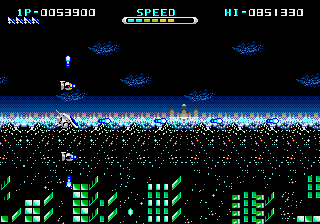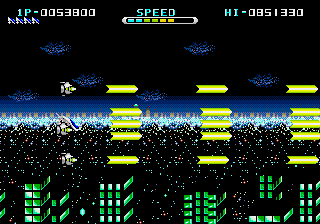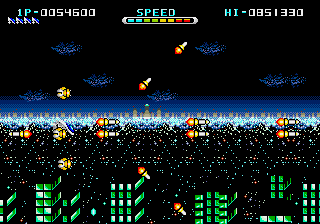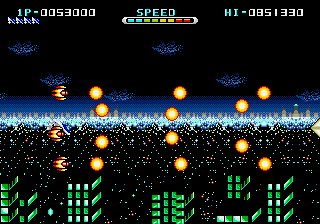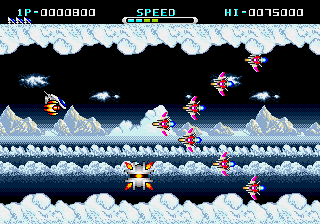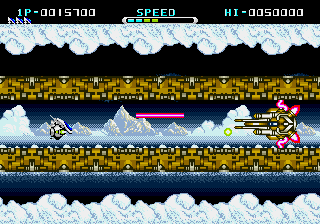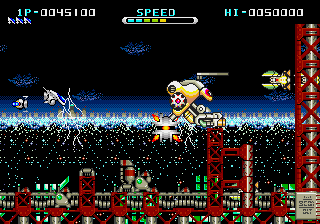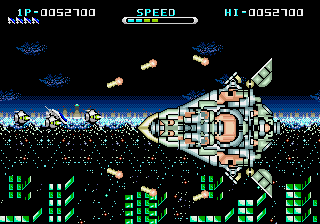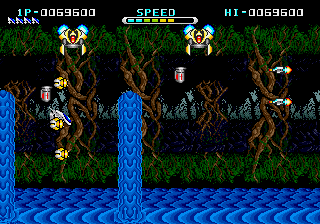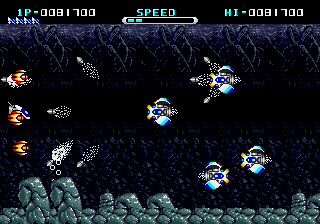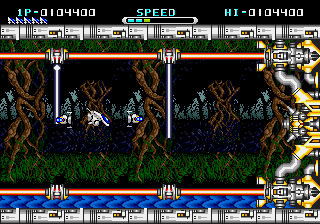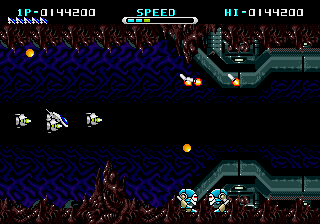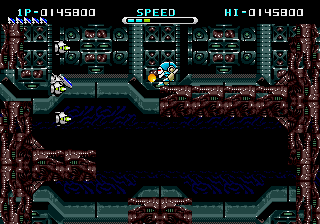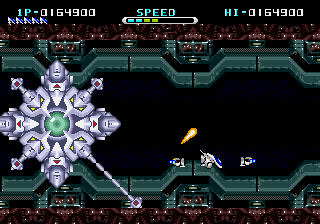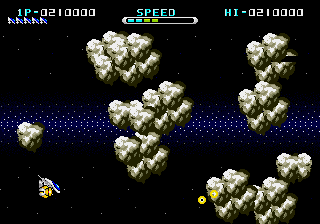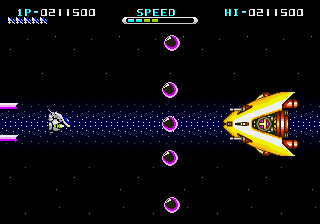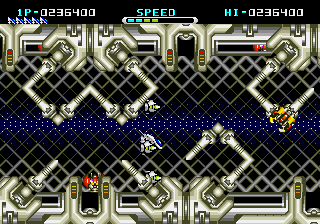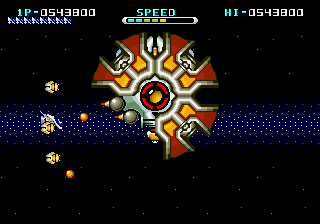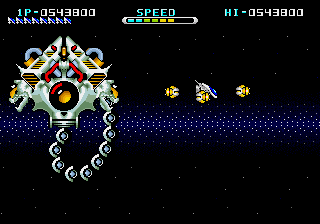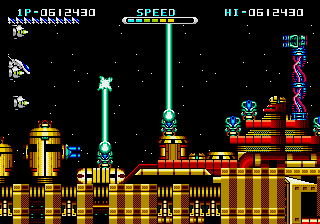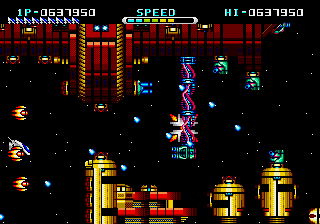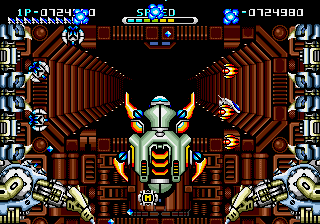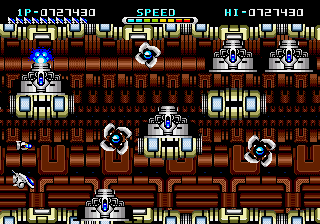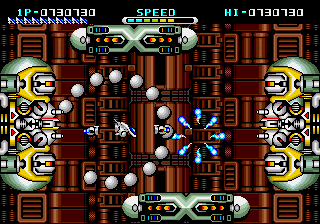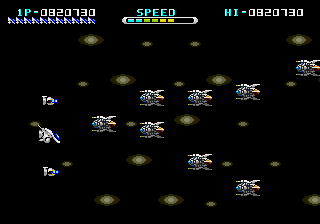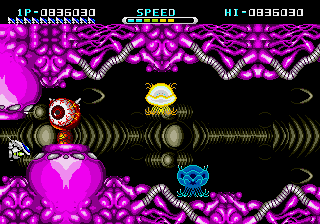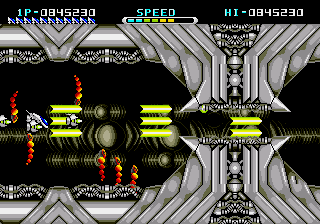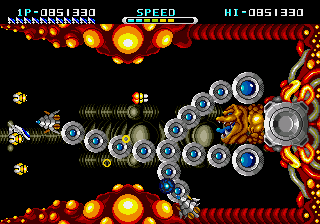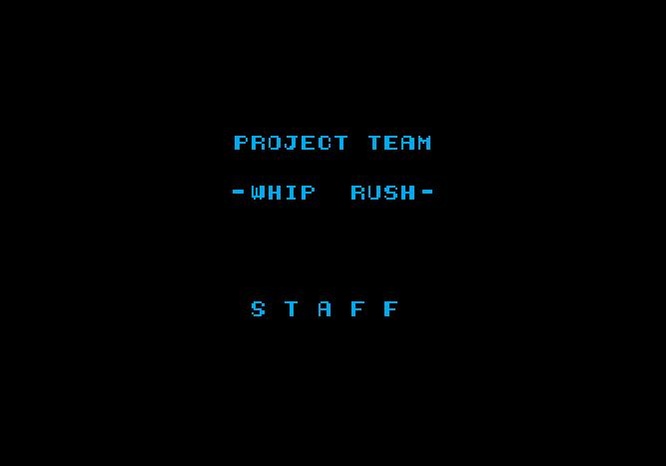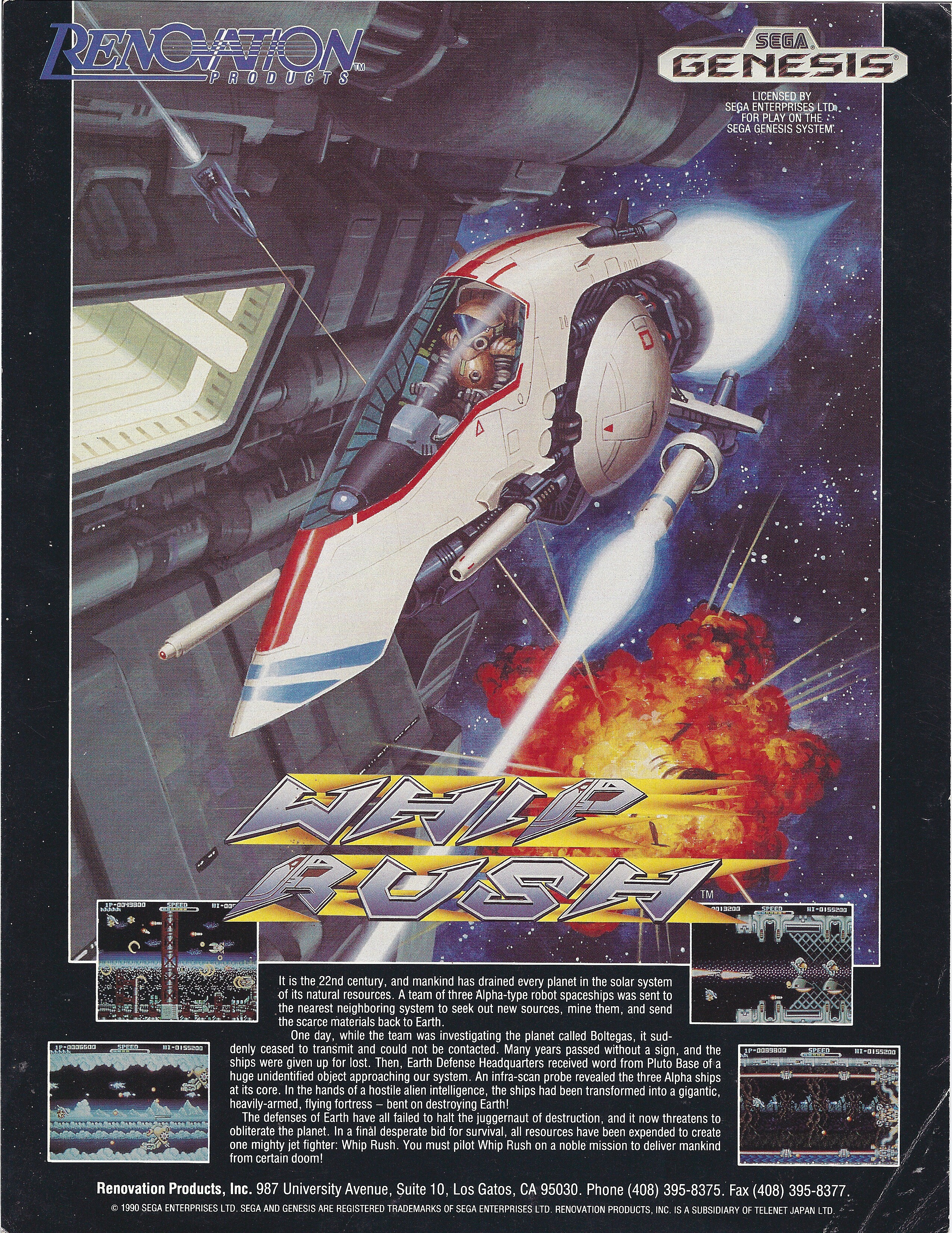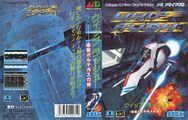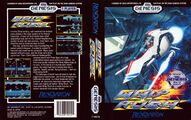Whip Rush
From Sega Retro
| |||||||||||||||||||||||||
| Whip Rush | |||||||||||||||||||||||||
|---|---|---|---|---|---|---|---|---|---|---|---|---|---|---|---|---|---|---|---|---|---|---|---|---|---|
| System(s): Sega Mega Drive | |||||||||||||||||||||||||
| Publisher: Sega Enterprises, Ltd. (JP), Renovation Products (US) | |||||||||||||||||||||||||
| Developer: VIC Tokai | |||||||||||||||||||||||||
| Sound driver: SMPS Z80 | |||||||||||||||||||||||||
| Genre: Shooting[1][2] | |||||||||||||||||||||||||
| Number of players: 1 | |||||||||||||||||||||||||
|
Whip Rush, called Whip Rush: Wakusei Voltegas no Nazo (ウィップラッシュ 惑星ボルテガスの謎) in Japan, is a Sega Mega Drive horizontal shoot-'em-up developed by VIC Tokai. Published in Japan by Sega in May 1990, it was later published in the United Stated by Renovation Products in October that same year.
Contents
Story
In the 22nd century, mankind has drained every planet in the Solar System of its natural resources. Three Alpha-type robotic spaceships left the overpopulated Earth on a mission to find similar planets to colonize. After five years, the pilots reported finding a similar planet they learned was called Voltegas (Voltegeus in the US version), but upon approach, their transmission was lost and the ships never re-established contact. Less than a week after the discovery, a massive alien vessel materialized in the vicinity of Mars and started attacking the Earth. It is now up to Earth's smallest but most powerful spaceship, the Whip Rush, to stop the invasion of the Voltegians and discover the fate of the missing colony ships.
Gameplay
The game is a side-scrolling shoot-'em-up. Stages scroll mostly horizontally but also include vertical segments. The player must battle enemy forces and ultimately a boss at the end of the stage. The stage design emphasizes maneuvering the Whip Rush around obstacles. The Whip Rush can move in any direction using the D-Pad and fires with ![]() . The weapon has rapid-fire. The Whip Rush's movement speed can be adjusted with
. The weapon has rapid-fire. The Whip Rush's movement speed can be adjusted with ![]() ; the current speed is shown in a meter at the top of the screen.
; the current speed is shown in a meter at the top of the screen.
The Whip Rush starts with a basic weapon and can be equipped with new weapons, which are collected from capsules found in each stage. Weapons are upgraded up to two times by collecting the same weapon icon successively. The weapon level is maintained but not increased when changing to a different weapon. Additionally, the Whip Rush can find Power Claws, which are support drones that follow it and mirror its fire. The Power Claws have two positions, above and below the Whip Rush and to the left and right of it, which are rotated with ![]() . The Power Claws are invulnerable and can be used to ram enemies by holding
. The Power Claws are invulnerable and can be used to ram enemies by holding ![]() +
+![]() . Ramming the Power Claws sends them in opposite directions along the vertical or horizontal axis depending on their orientation, which is an effective way to deal with enemies at angles that the Whip Rush cannot directly attack with its standard armaments.
. Ramming the Power Claws sends them in opposite directions along the vertical or horizontal axis depending on their orientation, which is an effective way to deal with enemies at angles that the Whip Rush cannot directly attack with its standard armaments.
The Whip Rush takes damage from enemy fire or by touching enemies, obstacles, or terrain. If it has a power-up weapon equipped, it loses it and reverts to the starting weapon. If it takes damage when the starting weapon is equipped, the Whip Rush is destroyed and the player loses a life. The game ends if the player runs out of lives, but it can be continued if the player has credits remaining. The number of lives that the player starts with depends on the difficulty level (Easy, Normal, or Hard). The player gains an extra life at 50,000 and 100,000 points and every 100,000 points after that.
Weapons
The color of the Whip Rush and Power Claws changes to indicate the currently equipped weapon.
| Standard | |
|---|---|
| Shoots a stream of energy bullets forwards. It is the starting weapon and the weapon to which the Whip Rush reverts upon taking damage. It does less damage and covers less area than the other weapons and cannot be upgraded. The Power Claws shoot in opposite directions away from the Whip Rush; rotating them to the horizontal position adds additional frontal fire while still covering the rear. | |
| Lasers | |
| Shoots powerful laser beams forwards. It is the strongest weapon but also the least adaptable. The first upgrade adds a second laser beam, and the second upgrade adds a third laser beam. This is the only weapon that cannot shoot backwards at all, so the player is reliant on using the Power Claws to ram enemies behind the Whip Rush. The Power Claws also shoot lasers forwards. | |
| Missiles | |
| Fires missiles forwards. It covers the most area of all the weapons when fully upgraded. Missiles seek nearby enemies. The first upgrade adds a second stream of missiles behind the Whip Rush, and the second upgrade adds a second stream of missiles to the front. The Power Claws shoot streams of missiles at acute angles. | |
| Fireballs | |
| Shoots fireballs in the opposite of the last pressed direction. It is the most flexible weapon to aim and can also aimed in intermediate directions, though aiming can be tricky since it conflicts with movement. The first upgrade adds a second stream of fireballs in the same direction, and the second upgrade changes the firing pattern from a line to a sinusoid to cover a taller area. The Power Claws shoot fireballs forwards. |
Items
| Capsule | |
|---|---|
| Attack to release an item. | |
| Laser | |
| Changes the current weapon to Lasers or upgrades the weapon level, up to two times, if already equipped. | |
| Missile | |
| Changes the current weapon to Missiles or upgrades the weapon level, up to two times, if already equipped. | |
| Fireball | |
| Changes the current weapon to Fireballs or upgrades the weapon level, up to two times, if already equipped. | |
| Power Claw | |
| Spawns a Power Claw drone to follow the Whip Rush and augment its fire. Power Claws can also be used to ram enemies. The Whip Rush can have up to two Power Claws. |
Stages
| Stage 1 | |
|---|---|
| Stage 2 | |
| Stage 3 | |
| Stage 4 | |
| Stage 5 | |
| Stage 6 | |
| Stage 7 | |
Versions
Localised names
| Language | Localised Name | English Translation |
|---|---|---|
| English (US) | Whip Rush | Whip Rush |
| Japanese | ウィップラッシュ 惑星ボルテガスの謎 | Whip Rush: Wakusei Voltegas no Nazo |
Production credits
- Object and Scroll Designer: Yamanba, Kuninori Asano
- Scroll Designer: Toshiya Kino
- Title: Yamanba
- Opening: Yamanba
- Ending: Porten
- Game Designer: Kazuaki Kinoshita
- Programmer: Taka Yan, Nabechan, K.Iwa
- Sound: Seriinu and Sebastian
- Cover artist: Yuji Kaida
Magazine articles
- Main article: Whip Rush/Magazine articles.
Promotional material
also published in:
- Game Players Sega Guide! (US) #0101: "Vol. 1, No. 1: Fall 1990" (1990-10-xx)[7]
Physical scans
| Sega Retro Average | ||||||||||||||||||||||||||||||||||||||||||||||||||||||||||||||||||||||||||||||||||||||||||||||||||||||||||||||||||||||||||||||||||||||
|---|---|---|---|---|---|---|---|---|---|---|---|---|---|---|---|---|---|---|---|---|---|---|---|---|---|---|---|---|---|---|---|---|---|---|---|---|---|---|---|---|---|---|---|---|---|---|---|---|---|---|---|---|---|---|---|---|---|---|---|---|---|---|---|---|---|---|---|---|---|---|---|---|---|---|---|---|---|---|---|---|---|---|---|---|---|---|---|---|---|---|---|---|---|---|---|---|---|---|---|---|---|---|---|---|---|---|---|---|---|---|---|---|---|---|---|---|---|---|---|---|---|---|---|---|---|---|---|---|---|---|---|---|---|---|
|
| 66 | |
|---|---|
| Based on 26 reviews | |
Technical information
- Main article: Whip Rush/Technical information.
References
- ↑ File:WhipRush MD JP Box.jpg
- ↑ 2.0 2.1 https://sega.jp/history/hard/megadrive/software.html (Wayback Machine: 2020-07-20 09:51)
- ↑ https://groups.google.com/g/rec.games.video/c/JVXpIBUKyDo/m/du5qVY3wReIJ
- ↑ Electronic Gaming Monthly, "September 1990" (US; 1990-xx-xx), page 66
- ↑ File:Whip Rush MD credits.pdf
- ↑ Sega TV Game Genga Gallery, Graphic Sha, page 105
- ↑ Game Players Sega Guide!, "Vol. 1, No. 1: Fall 1990" (US; 1990-10-xx), page 5
- ↑ 1700 igr dlya Sega, "" (RU; 2001-xx-xx), page 263
- ↑ Beep! MegaDrive, "June 1990" (JP; 1990-05-08), page 109
- ↑ Complete Guide to Consoles, "Volume IV" (UK; 1990-11-xx), page 37
- ↑ The Complete Guide to Sega, "" (UK; 1991-05-xx), page 51
- ↑ Console XS, "June/July 1992" (UK; 1992-04-23), page 136
- ↑ Cool Gamer, "9" (RU; 2002-10-13), page 235
- ↑ Electronic Gaming Monthly, "November 1990" (US; 1990-xx-xx), page 19
- ↑ Famitsu, "" (JP; 1990-0x-xx), page 1
- ↑ GamePro, "October 1990" (US; 1990-xx-xx), page 72
- ↑ The Games Machine, "August 1990" (UK; 1990-07-19), page 53
- ↑ Famicom Hisshoubon, "1990-11 (1990-06-01)" (JP; 1990-05-18), page 13
- ↑ Joystick, "Juillet/Août 1990" (FR; 1990-06-25), page 116
- ↑ Sega Mega Drive Advanced Gaming, "January 1993" (UK; 199x-xx-xx), page 95
- ↑ Mega Drive Fan, "October 1990" (JP; 1990-09-08), page 79
- ↑ Mega Play, "February 1991" (US; 199x-xx-xx), page 41
- ↑ MegaTech, "Xmas 1991" (UK; 1991-12-06), page 81
- ↑ Mean Machines Sega, "October 1992" (UK; 1992-09-xx), page 143
- ↑ Power Play, "8/90" (DE; 1990-07-13), page 123
- ↑ Sega Power, "October 1991" (UK; 1991-09-05), page 55
- ↑ Sega Pro, "April 1992" (UK; 1992-03-19), page 31
- ↑ Sega Pro, "April 1993" (UK; 1993-03-11), page 68
- ↑ Sega Saturn Magazine, "September 1995" (JP; 1995-08-08), page 87
- ↑ Tilt, "Septembre 1990" (FR; 1990-0x-xx), page 94
- ↑ Tricks 16 bit, "Tricks Sega Gold 800 igr" (RU; 1998-03-20), page 222
- ↑ User, "Ianouários 1991" (GR; 1991-xx-xx), page 66
- ↑ VideoGames & Computer Entertainment, "November 1990" (US; 1990-1x-xx), page 54
| Whip Rush | |
|---|---|
|
Main page | Comparisons | Maps | Hidden content | Magazine articles | Reception | Region coding | Technical information
Prototypes: 1990-01-29
| |


